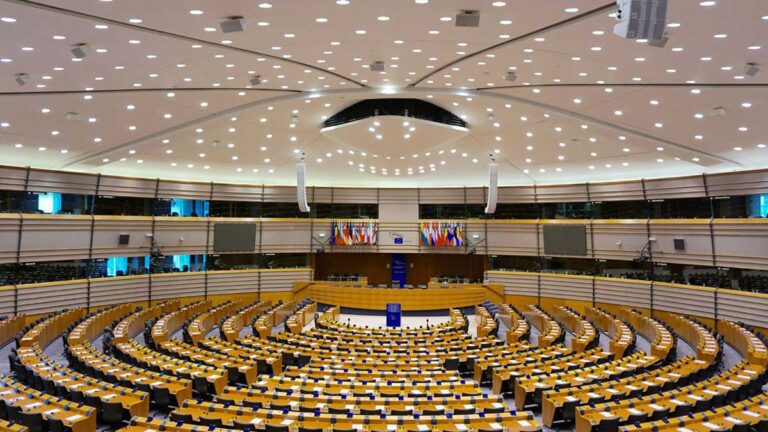
CSRD implementation and Environmental Management Systems (EMS) in accordance with ISO 14001/EMAS
By Merima Crnica and Matthias Kolck The Corporate Sustainability Reporting Directive (CSRD) not only specifies far more content for sustainability
Dear Andreas, you have been working in the insurance industry for more than twenty years. At UNIQA, you are responsible for Sustainability, Ethics and Public Affairs together with your team. If you come from the world of finance and accounting, as you do, you are used to strict regulations. At the moment, events at the EU level are overflowing with the Corporate Sustainability Reporting Directive (CSRD), the EU Supply Chain Act (Corporate Sustainability Due Diligence Directive, CSDDD for short) and the Greenwashing Directive. There is a great deal of momentum. On the other hand, there are also critical positions: They say that regulation overburdens, restricts competitiveness and inhibits economic growth in the EU. What is your opinion on this?
Andreas Rauter: Regulation is needed for one simple reason. Companies do not adapt, or do not adapt quickly enough, if the law does not stipulate it. Business models that are no longer the most ethical from today’s comprehensive sustainability perspective, but continue to yield a good margin, are often not changed voluntarily – as long as it does not damage the reputation. But to achieve our environmental goals or find solutions to climate change, we need proactive action and swift change. The timeline is short, and regulation is the only guarantee that something will happen quickly.
Of course, the question of whether this is clever or a shot in the arm is judged differently by the companies. But from my point of view, this question no longer arises. Sustainability in business is the EU’s great imperative. The 27 member states simply specify for their citizens that there are bans and strict rules for business. But it also shows how to follow the path towards sustainability. Following this path is definitely a great opportunity and a potential success factor for companies because this transformation takes time, penetrates the company deeply and cannot be copied so quickly. But this is not universally trusted. Where letting go of unsustainable or brown business models succeeds too little or not fast enough, the pressure is needed, and equally for everyone. The relevant laws ensure that this is the case.
I would see it much more like this: Europe has succeeded in doing something outstanding with the CSRD, also in an international comparison. This is because the 12 European Sustainability Reporting Standards (ESRS) prescribe in a very precise and structured manner how and what must be disclosed. The ESRS are characterized by the fact that they go into great depth and ensure a certain degree of comparability. They are application-oriented and less principle-oriented. In the end, as a reader, I see exactly how the company’s sustainability is doing and important questions are answered: Are there strategies and goals for sustainability and how seriously are they being pursued? Are there action plans and KPIs? Is there incentivization through salary? If not, one can assume that the company can’t care that much about sustainability. Of course, this is taken as blaming. But it does make a difference where big phrases about sustainability and purpose are sprinkled around, but there is little tangible to communicate in line with the standards.
How are the ESRS to be understood in the context of the CSDDD and to what extent do the directives intertwine?
The in-depth disclosure based on the ESRS, i.e. according to strict rules, is one thing. The other is the CSDDD and the establishment of quality requirements for careful corporate governance. I very much welcome this development, because the CSDDD shows how due diligence is to be understood and should be lived. Article 15, which has already been voted on by the EU Parliament, nails the big companies down here: the sustainability goals that a company lists in its reporting must be pursued. As of now, this is out of the question. In addition, companies within their industry must help shape the European transformation to sustainable business.
What I also very much welcome is the firm mounting of due diligence in governance. The top echelons, i.e. the Supervisory Board and the Board of Management, are liable for CSDDD. Due diligence is to be bolted into all processes with the appropriate policies. Consequently, the CSDDD ensures that you address upstream and downstream in the value chain how, for example, employees are treated, under what conditions production takes place, and what this means for the environment. Standard contractual clauses then regulate which decent principles are expected from customers and suppliers. This means that the sustainability requirements extend beyond the company’s own boundaries. If the duty of care is disregarded, administrative penalties may be imposed. In addition, plans must now be in place for how to react if abuses are discovered. The CSDDD is thinking ahead and is extremely prudent.
It is often said that we are in international competition. Many people who look beyond the EU’s borders see regulation as a disadvantage for the economy based here. What do you think of this statement?
For me, three aspects in particular are important in the competition discussion with regard to sustainability.
Firstly: Sustainability is not an EU project. There has long since been competition between the continents, although the approaches do differ. The USA, for example, is spending a lot of money and is clearly focusing on incentives. This is how they attract scientists, entrepreneurs and start-ups to the United States. The U.S. does not work as much with prohibitions as we do in the EU. But the question still remains: How quickly will they leave the brown business models behind? Can green incentives really be enough? Or is brown punishment also needed here, e.g. via carbon prices? In parallel, China is also working on technological solutions and is gaining quite a bit of momentum here, as can be seen, for example, in the e-mobility offerings and EU imports in the automotive sector or in PV technology.
We are in a global race. So the question is not which continent is concerned with sustainability, but: How does all this now affect a company that only does business in Europe or is globally active? How can companies act intelligently and align themselves with the needs of their stakeholders? That is the crux of the matter. It is now about serious, long-term and honest alignment. Donating something once a year or being present at some round table and publishing nice photos, but then continuing the usual business that doesn’t fit this image – that doesn’t work anymore. Example: I can’t make a public appearance with gender and diversity commitment on the one hand and then do business in countries that disregard human rights. The hoisted rainbow flag in the office is not credible and even counterproductive, which leads me to the other two points.
Increasing regulation has a social effect because it demonstrates that the rules are becoming stricter. This influences all of us and is reflected, for example, in our own consumer behavior. And then there is another important aspect: skilled workers are in high demand. The younger generation in particular is thinking very carefully about where they want to work. What’s more, young people are the future decision-makers, which again has a positive influence on the whole development. So, secondly: When discussing sustainability, we must not forget the competition for the best workers and their value systems, and this competition also takes place across borders.
Thirdly: Green companies look for the right counterpart and think very carefully about who they do business with. The cheapest price does not work here. Companies with a forward-looking approach and good intentions have exciting prospects in both directions – customers and suppliers. An honest commitment to sustainability makes it more attractive to companies that are further ahead in the transformation process. It is very plausible that these developments will increase, also driven by regulation. In addition, there is pressure from stakeholders and sparring with NGOs, which know the legal situation and obligations in detail. Thus, ignorance is also not an argument to continue as before. And if I am made aware of negative issues or am involved in scandals, which are often widely reported in the media, I have to face up to this as a company. And I also have to accept that this has a negative effect on employees, customers and other important stakeholders.
If you consider all of these aspects, it quickly becomes clear that ignoble management is not the way forward, and this line of argument is very good for convincing internal decision-makers who are not yet so motivated with regard to sustainability.
With all the legal developments and bans: How do we in the EU manage to support good contributions in companies and what is the role of the banking and insurance sector here?
This is a very important point that is often discussed. I am convinced that companies need both: Shutting down the bad and promoting the positive. This whole sustainability debate in the EU is certainly not exclusively about avoiding negative effects through bans, but also about doing the right thing. This is already being supported by subsidies. But the line is of course blurred as to what is good or bad. Incentivizing people to do the right thing also requires a change in thinking. We’re noticing that in our industry, too.
At the moment, we are discussing at banks and insurance companies which rules of the game make any sense at all in this whole sustainability development. As a systemically important industry, we have strict rules for dealing with risks. Functioning risk management is essential. Now we are asking ourselves how we should handle the control elements of “risk and return” in the sustainability debate. It quickly becomes clear that the requirements of risk management are in line with current regulations.
For green shares, which are in line with the EU taxonomy, less equity can be held, for example, because the risk here is classified as lower, while for brown shares, for example, 50% is provided for. Let’s transfer this to a concrete example: Coal stocks are, in the meantime, classified by analysts as more risky and therefore need a different hedge. And bonds and other instruments for raising capital also function according to this principle. The risk requirement automatically increases the attractiveness of green products.
For risk management, however, this also means that a purely past-based assessment of risk can no longer be helpful when so much new information is coming out of the regulatory corner. It is much more meaningful to analyze how a company is moving within the EU sustainability corridor and how far advanced it is in its transformation. As a result, data from the past can no longer be weighted as heavily as was previously the case. So we need a rethink there, too.
With regard to incentivization, there is now another aspect that I consider important: Disclosure of sustainability information also includes opportunities, including monetization. This raises the question of what opportunities I can secure for myself as a company if I consistently leave out the bad and focus on a purely sustainable business model. That brings us directly to strategy. Of course, it’s not something that can be done overnight. It requires an intensive examination of the topic, an understanding of the stakeholders and a willingness to make decisions at the C-level. I would say that we at UNIQA are already on a very good path here. But we have also done a lot for years.
What role did denkstatt play in UNIQA’s sustainability journey?
As a listed company, we were very early on at that time and a relationship of trust has been built up over the years. We took the first small but very rewarding steps with denkstatt back in 2015. Instead of hard-nosed sustainability demands, they created a basis of trust by winningly pointing out potentials and accompanied us in making further gains in sustainability performance. The cooperation has helped us to make a disclosure that is responsible, correct and adequate with a minimum of internal effort. This was a great relief for us in the team, and it allowed me to devote myself to the strategic issues that naturally also occupy us at UNIQA.
What is decisive for me personally, however, is that working together as like-minded people on such an important topic over many years creates a bond. And denkstatt has succeeded in keeping up with the growth of the sustainability topic and going to scale, and we can be excited about what the future holds.
Let’s stay with the future right away. Sustainability also means ensuring transparency, and that happens through information and data. Where will we go with this topic in the next few years?
I think that accounting here is already very guiding for the disclosure of sustainability information. For me, accounting means always correctly reflecting reality, and the same must also be guaranteed for sustainability data in the long term. This is a question of automation in data management. In the next few years, digital solutions will increasingly help us to view sustainability data at the push of a button and compare our targets with reality. Deviations will thus be immediately recognizable and key figures will be available on a daily basis, also for external communication. This subsequently means that sustainability information could be shared not just once a year in the report, but on a daily basis, for example on the website. This creates a whole new level of transparency.
I am convinced that technological developments are making an important contribution here. Let’s take the example of the carbon footprint. A company must already be able to track exactly where the hotspots are located, how much and what electricity has been purchased, and so on. In the future, this will all be supported by smart contracts and blockchain technology. Developments are moving towards data being audited and stored centrally and being able to be viewed for relevant purposes. There are very exciting developments in the EU right now because we know that this is the future.
Let’s go one step further, based on all the changes ESRS are now bringing. Where will we be in 30 years, and where will the insurance industry rank?
We will definitely follow the direction that has now been taken: Mandatory disclosure and tougher validation of information through the CSRD audit requirement are just the beginning. All of this will lead to the emancipation of stakeholders, i.e. customers, employees, the investor community and the public in general. I believe that cooperation among stakeholders will become stronger and that their interests will converge further. There will be increasing agreement that business models must deliver a performance for society. Europe is going in absolutely the right direction with the EU Green Deal and this will prove true in the future.
I think it is much more realistic for us to shape the future through sustainability and technology with an edge than to compete against China with cost scaling, for example. If we look internationally, I think the remaining brown value chains will cannibalize each other and yield less and less margin. By stepping forward in the EU, we can set an example and others will follow. But for this to happen, we also need a healthy mix of research, technological edge, and picking up where society is going. I am sure that the critical voices will then become quieter and quieter and a consensus will form that we as a society want to go down this path.
When I think about the future of UNIQA as insurance, on top of that with the slogan “Living better together”, then this must also be reflected in society. We have to consistently address the issues that society needs more of. That’s where we automatically end up in the sustainability perspective, where environmental and social issues meet. And we have to ask ourselves a very central question: Why should UNIQA be left with a margin in the future? Against the background of increasing transparency, people should be able to say: “Yes, that’s okay. UNIQA can do that and does it in a responsible way for society.”
In 30 years, the service will not only consist of insurance and payment in the event of a claim. The service will go in the direction of life support. Let’s take the example of aging and health. Insurance companies could operate retirement homes and hospitals, cooperate with research and science, and create offerings that are tailored precisely to the needs of society. These could be service packages financed from taxes, which then move in the direction of moderated life support. Of course, this requires the trust of our stakeholders, which we can only achieve through honest sustainability statements in the present, and that brings us back to the initial topic. It is already a matter of honest endeavor, and this cannot be postponed until the future.
Thank you very much for the interview.
Thank you as well.

By Merima Crnica and Matthias Kolck The Corporate Sustainability Reporting Directive (CSRD) not only specifies far more content for sustainability

Eventually, an agreement was reached between the Council and the European Parliament on the provisional terms of the CSDDD. The

From 30 November until 12 December, the COP28 took place in Dubai, with more people taking part than ever. Although many
